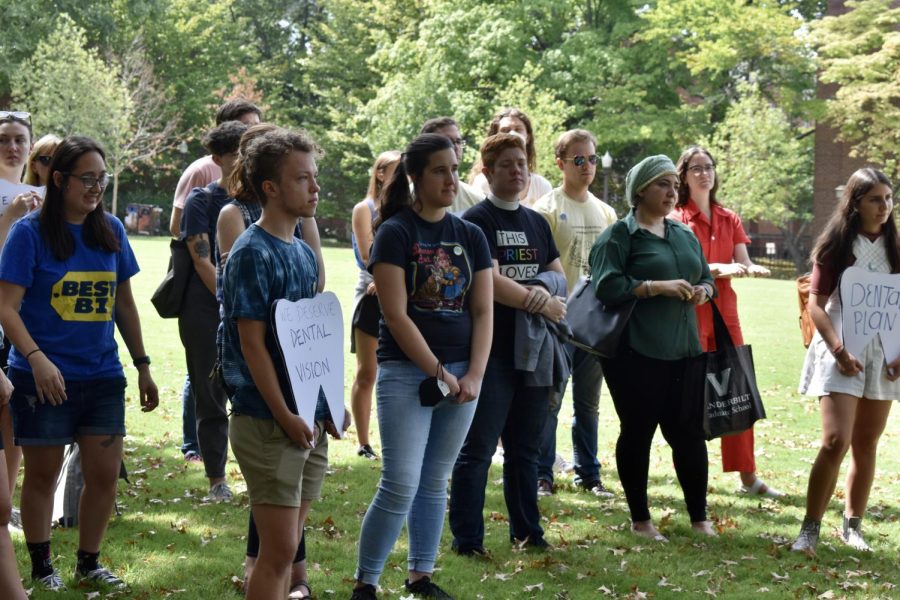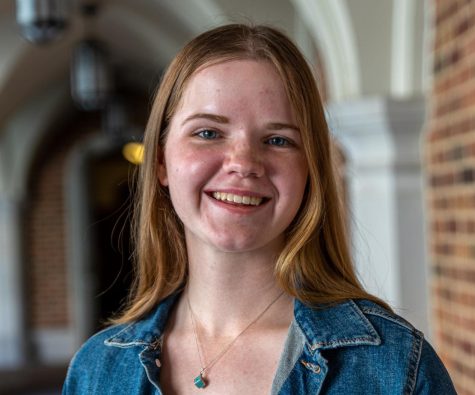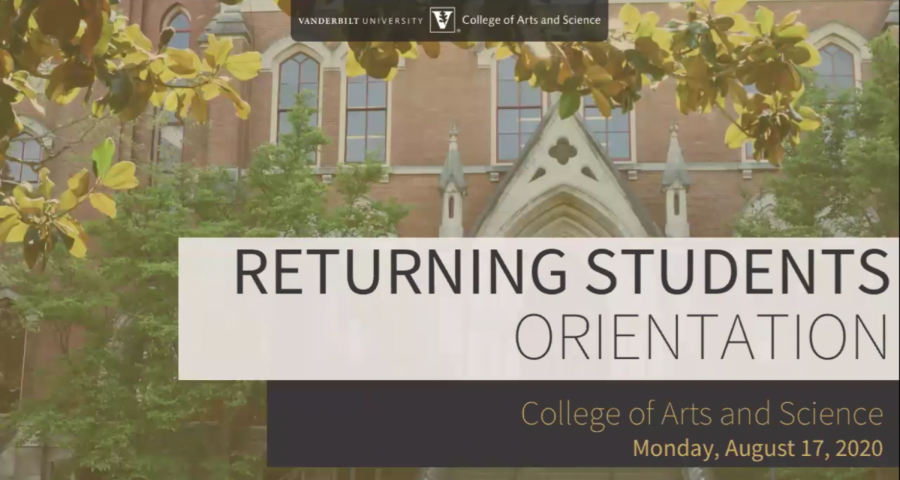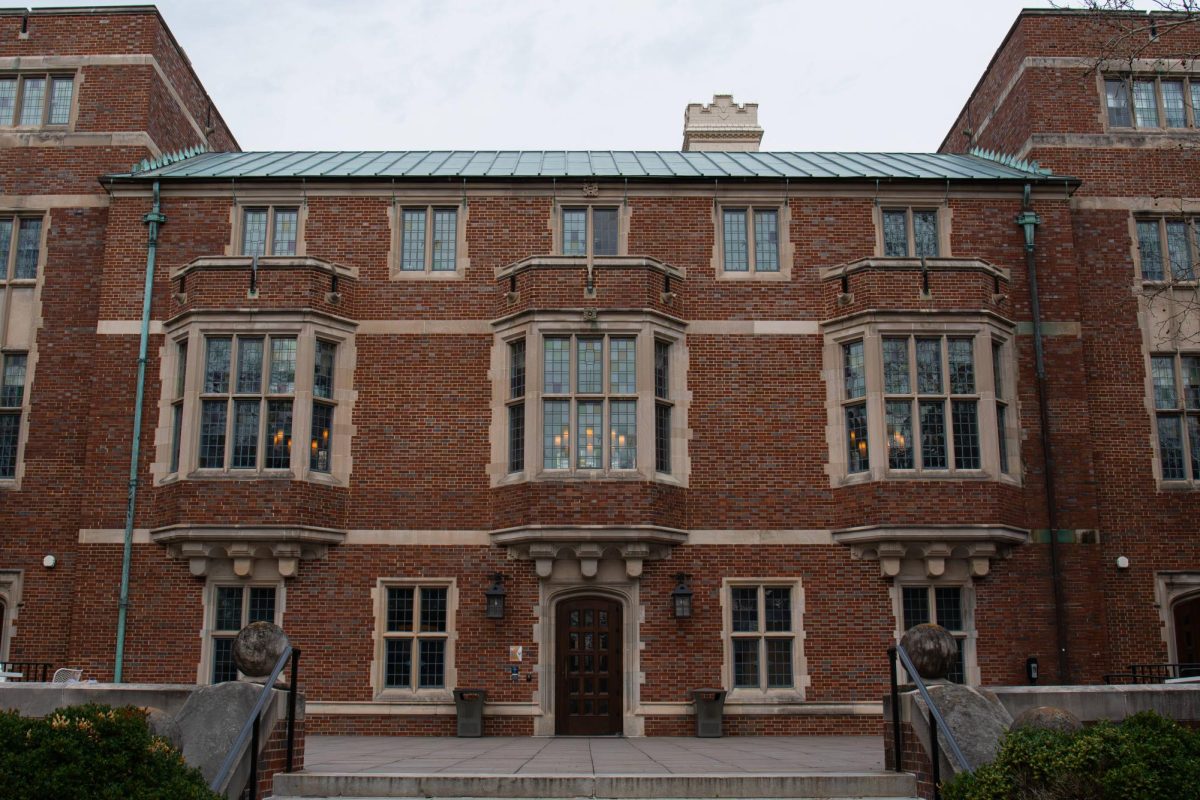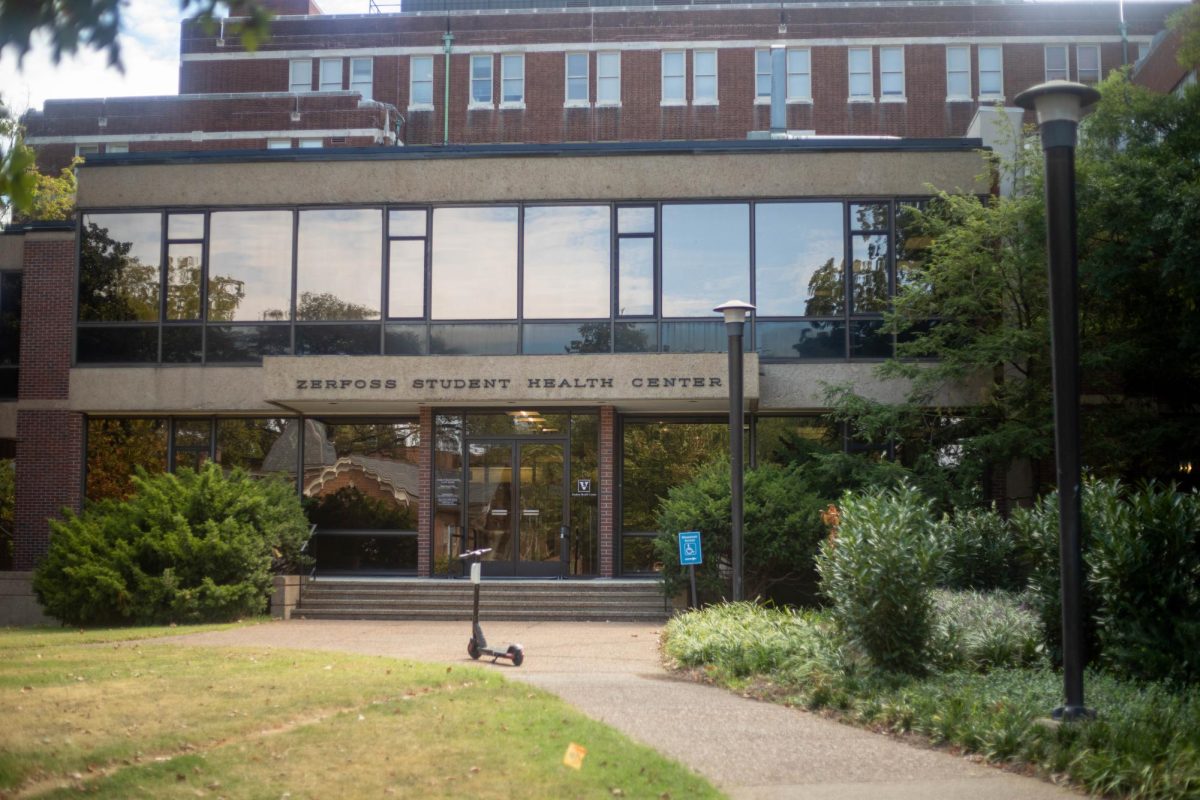Over 45 Vanderbilt Graduate Workers United (VGWU) organizers, other graduate students and advocates from Dignidad Obrera (Workers’ Dignity)—an organization that advocates for economic justice in Nashville—gathered at Alumni Lawn on Sept. 9 for a town hall and protest. They called on Vanderbilt to offset the cost of vision and dental insurance for graduate students.
Vision and dental insurance are currently listed as add-ons for graduate and undergraduate students enrolled in the Student Health Insurance Plan (SHIP), meaning that students must pay an additional premium to receive coverage. VGWU requests that the university cover 75% of vision and dental premiums for graduate students on the SHIP plan. Fourth-year graduate student and Graduate Student Council (GSC) secretary Michael Reynolds cited inflation and the rising cost of living in Nashville as reasons why affordable dental and vision coverage is a pressing issue.
At the demonstration, attendees carried signs with messages such as “We need to see,” “Insure me!” and “Nerds need glasses!” VGWU’s petition, which details their demands, has 1,085 signatures from graduate students, faculty and community members listed on the document as of print.
Third-year graduate student and VGWU communications chair Nick Goodell said he is unable to afford the wisdom teeth removal surgery that he needs. First-year graduate student Kieren Coffey stated that he cannot afford to have regular teeth cleanings or access preventative care such as dental x-rays. Sixth-year graduate student Katrina Ngo described making the choice to get married and file as a dependent under her partner’s insurance to pay for her wisdom teeth removal surgery and eye exams due to the high cost of SHIP’s vision and dental insurance premiums.
“My boyfriend at the time was like, ‘let’s just get married so that you can have my insurance. So life-hack, you can just get married,’” Ngo said, receiving laughter from the crowd. “Luckily, I’m on his insurance now, but it sucks that we had to rush that decision.”
In a press release for the event sent to The Hustler, VGWU claimed that Vanderbilt has adequate financial resources to provide subsidies to graduate students, pointing to the size of the university’s endowment. In 2021, Vanderbilt reported a 57.1% increase in the school’s endowment, totaling $10.9 billion. In a Sept. 9 message to The Hustler, a university representative stated that the university is engaging with GSC, the “official organization representing graduate students at Vanderbilt,” to discuss “questions and concerns” about current coverage options.
“We are considering the feedback we have heard and are working with our plan administrator on options going forward,” the university stated. “A group of students who are not the recognized representative body for graduate students at the university organized today’s demonstration.”
Per GSC President and third-year graduate student Miguel Moravec, the GSC met with Christie-Mizell and Dean of Students G.L. Black on July 9 to advocate for 75% or more of vision and dental premiums to be subsidized by the university.
“The GSC recognizes all groups composed of our graduate student constituents, including VGWU, as important campus stakeholders and partners,” Moravec said. “The GSC unanimously endorsed sharing the dental/vision petition.”
VGWU stated that Vanderbilt should implement coverage-related reforms to stay competitive in the market for graduate students. Several of Vanderbilt’s peer institutions provide insurance subsidies for graduate students.
Universities with some of the most comprehensive benefit packages include Brown University and Columbia University, which provide a 100% and 75% subsidy of the dental insurance premium for PhD students, respectively, and access to a vision discount program. Georgetown University also covers 100% of PhD student’s dental insurance premium but does not subsidize vision insurance. Harvard University, Duke University and Tulane University are among other peer institutions that The Hustler was able to confirm provide at least partial dental and/or vision subsidies to graduate students.
“Vanderbilt claims to be a top-tier university. How are we going to attract talent without decent health insurance?” eighth-year graduate student and VGWU secretary Alex Korsunsky stated in the press release. “If we’ve got a prospective recruit with a competing offer from Brown or Georgetown, I couldn’t in good faith tell them to come here.”
Coffey stated that maintaining the health of graduate students would positively impact student performance and productivity, thus benefiting the university.
“I think it makes a lot of sense to take care of the people that work for you,” Coffey said. “You have a bunch of graduate students, and you don’t pay for them to get eye exams when we read for a living.”
Students also shared resources for graduate students seeking additional financial assistance. Third-year graduate student and VGWU co-president Maxwell Hamilton explained that students working in biological and medical science departments affiliated with the Office of Biomedical Research Education and Training (BRET) can be reimbursed for dental and vision insurance costs, but the opportunity is only available for students whose advisor is willing and able to pay using their grant funding. Similarly, Reynolds described how he successfully applied for financial assistance after receiving care from the Vanderbilt University Medical Center (VUMC). Assistance is given on a case-by-case basis to individuals with no or limited insurance benefits.
Although Hamilton seeks to educate other graduate students about their healthcare options, he took issue with the university having a “patchwork” of resources rather than a subsidy for all graduate students, regardless of department or lab affiliation.
“The fact that your insurance is contingent on which lab you join is completely ridiculous. You have to have an awkward conversation with your advisor, and they might say no,” Hamilton said. “Really, everyone should just get it [coverage] unconditionally.”
Other recent advocacy by graduate students surrounding this issue includes a March 22 open letter from BRET graduate students that described a lack of vision and dental coverage as an exacerbating factor of an alleged graduate student mental health crisis. On May 9, Christie-Mizell sent an email to graduate students, which detailed new mental health and financial resources for graduate students, but did not include changes to insurance subsidies.
After sharing testimonials and speeches, the town hall attendees walked to Alumni Hall, the location of Graduate School Dean André Christie-Mizell’s office, to deliver a copy of their petition to him. Per third-year graduate student and VGWU treasurer Patrick Reilly, the dean was not present when the graduate students entered his office, and an administrative assistant declined to deliver the petition to Christie-Mizell or allow the students to place it into his mailbox. Reilly stated that the group left the petition in a “visible, open area” in the office.

